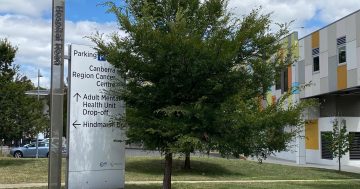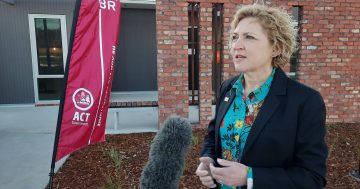
Minister for Mental Health Emma Davidson, CEO of COTA ACT Jenny Mobbs, Chair of the Ministerial Advisory Council on the Ageing Prue Powers, Member of the Mental Health Advisory Council Judy Bentleigh, Coordinator-General for the Office for Mental Health and Wellbeing Dr Elizabeth Moore. Photo: Lottie Twyford.
Older Canberrans have been among the most impacted groups in the past two and a half years since the pandemic first disrupted normal life in the ACT.
Many have endured long periods of isolation due to needing to stay away from the community to protect their physical health. Others have dealt with severe bouts of illness that left them further isolated, some for months at a time.
Judy Bentleigh is one of those people. She is also a member of the Mental Health Advisory Council.
“I had a devastating experience with COVID-19 and it was life-threatening,” she said.
“People seem to think it’s fine if [we] die because, oh well, [we’re] old anyway. They are somebody’s mother.
“I found the isolation awful to endure. Now, I don’t go to the shops; I don’t go to dinner. I feel angry when I see people not wearing masks when they are in public.”
CEO of Council of the Ageing ACT Jenny Mobbs has noticed an increase in demand since the pandemic.
“We do think many of those people are looking for companionship,” she said.
“They are still worried about COVID-19 but they do need that social contact. They weigh up who has had COVID-19 and who hasn’t… and they pick the need to socialise with friends.”
As the make-up of Canberra changes, so too do the ways in which the healthcare and social support sector experiences demand.
Experiences like Ms Bentleigh’s risk becoming more common as the ACT’s population ages.
It’s acknowledged that older people are vulnerable to poor mental health due to factors like chronic disease and disability; changes in socioeconomic circumstances after retirement; and the social and emotional challenges associated with ageing.
They can also experience mental illness and many care for people close to them who have a mental illness or who experience dementia.
Ms Mobbs said this doesn’t mean this cohort isn’t engaged in the community and has a desire to remain so.
“Canberra’s older people are working longer and they are also increasingly picking up childcare duties,” she said.
“They have a lot to offer in this city. They are our volunteers in all of our national institutions. Without them, Canberra would fall apart.”
That doesn’t mean they don’t need support – whether that’s just company or help navigating the mental health system.
These considerations have prompted the Territory government to release a comprehensive strategy to improve the mental health and wellbeing of older Canberrans.
That strategy has outlined 25 actions aimed at improving the system, as the government acknowledged there are “gaps” that could be addressed.
“Canberra has one of the highest standards of health and wellbeing for older people across the country, yet many still experience poor mental health due to changes in lifestyle following retirement, increased susceptibility to chronic conditions, and the social and emotional challenges that are, at times, associated with ageing,” Mental Health Minister Emma Davidson said.
“We know an environment that allows older people to live active, productive and mentally healthy lives is critical to support healthy ageing. This strategy will strengthen collaboration across sectors to improve responses and support services that promote the mental health of older persons so they can live well as they age.
“It’s about making sure we have the right services in the right place at the right time.”
The first two years of the strategy will comprise a range of research and scoping projects across areas such as suicide prevention, homelessness and access to culturally sensitive services.
After those two years, the strategy will be reviewed to assess progress and determine priorities for the following years.
You can read Towards our Vision: Re-envisioning Older Persons Mental Health and Wellbeing in the ACT Strategy 2022-2026 online.
If this story has raised concerns for you, contact Lifeline on 13 11 14. If someone is in immediate danger, call 000. Information and support for anxiety, depression and suicide prevention are available through Beyond Blue.





















